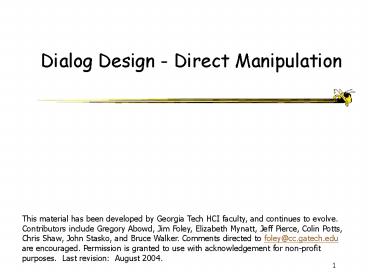Dialog Design Direct Manipulation - PowerPoint PPT Presentation
1 / 23
Title:
Dialog Design Direct Manipulation
Description:
DM Disadvantages. What could possibly be wrong with direct manipulation : ... Some DM Disadvantages. Screen space intensive (info not all that dense) ... – PowerPoint PPT presentation
Number of Views:48
Avg rating:3.0/5.0
Title: Dialog Design Direct Manipulation
1
Dialog Design - Direct Manipulation
This material has been developed by Georgia Tech
HCI faculty, and continues to evolve.
Contributors include Gregory Abowd, Jim Foley,
Elizabeth Mynatt, Jeff Pierce, Colin Potts, Chris
Shaw, John Stasko, and Bruce Walker. Comments
directed to foley_at_cc.gatech.edu are encouraged.
Permission is granted to use with acknowledgement
for non-profit purposes. Last revision August
2004.
2
Dialog Styles
- 1. Command languages
- 2. WIMP - Window, Icon, Menu, Pointer
- 3. Direct manipulation
- 4. Speech/Natural language
- 5. Gesture, pen
3
Agenda
- Review of dialogue design issues
- Direct Manipulation
- Advantages, disadvantages
- Design guidelines
- Another characterization of DM
4
Review - General Issues in Choosing Dialogue Style
- Who is in control - user or computer
- Initial training required
- Learning time to become proficient
- Speed of use
- Generality/flexibility/power
- Special skills - typing
- Gulf of evaluation / gulf of execution
- Screen space required
- Computational resources required
5
DM
- What is direct manipulation?
- That is, how can we characterize DM?
- How do we know it when we see it?
6
DM Characteristics
- Continuous visibility of the objects and actions
of interest - Rapid, reversible, incremental actions whose
effect is immediately noticeable - Replacement of command language syntax by direct
manipulation of object of interest (physical
actions, buttons, etc.)
Shneiderman 82
7
DM Examples
- Examples
- WYSIWYG text and graphics editors
- VISICALC - 1st electronic spreadsheet
- CAD
- Desktop metaphor
- Video games
- 3D immersive Virtual Reality systems
8
DM Essence
- Representation of reality that can be manipulated
- The user is able to apply intellect directly to
the task - The tool itself seems to disappear
9
Direct Manipulation Advantages
- Write down some advantages, individually or in
groups - If in class, now share with the group
10
Some DM Advantages
- Easier to learn remember, particularly for
novices - Direct WYSIWYG
- Flexible, easily reversible actions helps reduce
anxiety in users - User in control
11
DM Advantages
- Provides context instant visual feedback so
user can tell if objectives are being achieved - Easier to remember how to use if are infrequent
user - Exploits human use of visual spatial cues
- Limits types of errors that can be made
- Reduces need for error messages
12
DM Disadvantages
- What could possibly be wrong with direct
manipulation ) - Write down some disadvantages,individually or in
groups - If in class, now sharewith the group
13
Some DM Disadvantages
- Screen space intensive (info not all that dense)
- Need to learn meaning of components of visual
representation - Visual representation may be misleading
- Mouse ops may be slower than typing
- Subtle aspects may not be self-explanatory
14
DM Disadvantages
- Not good at
- Repetition
- History keeping (harder)
- Certain tasks (Change all italics to bold)
- Abstract elements (variables)
- Macros harder
15
What systems use DM?
- Word?
- Emacs?
- Powerpoint?
- Unix?
- Palm Pilot?
16
Any Way to Combine DM and CL?
- Show commands that DM is using
- Show DM effects of commands
17
A More Psychological View of DM
- What is directness? (not always done well)
- Related to two things
- Distance
- Engagement
Hutchins, Hollan, Norman 86
18
Distance
- Two gaps or gulfs between users goals and
system image - Directness partly depends on the distance between
these two gulfs - Gulf of execution
- Gulf of evaluation
Execution
Goals
System
Execution
19
Gulfs
- Gulf of execution
- Distance between users goals and means of
achieving them in system - Does the system allow the user to do what they
want? - Gulf of evaluation
- Amount of effort person must expend to interpret
system state and judge if intention was achieved - Can use perceive if progressing favorably?
20
Directness and Distance
- Two types
- Semantic - Relation between what user want to
express and what is available in interface - Can I say what I want (concisely)?
- Articulatory - Relation between meanings of
expressions and their physical form(s) - Is the way to perform an action expected and
clear (appropriate)?
21
Engagement
- Feeling that you are directly manipulating the
objects of interest - Promoted by
- Unobtrusive interface
- Minimizing gulfs of execution and evaluation
- Appropriately responsive system
22
Ultimately...
- In end, must characterize direct manipulation by
feeling of directness and illusion of
manipulating objects at hand
23
The End































